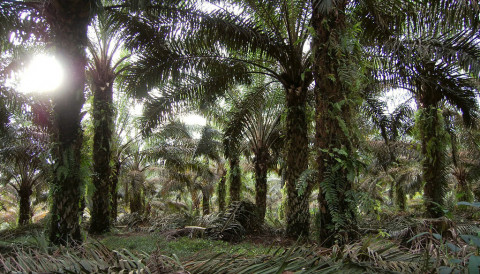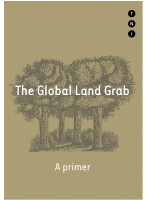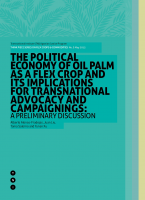Advocates for sustainable palm oil are ignoring human rights violations in Latin America
A false picture of a sustainable industry was painted for investors and other participants, last month at the Roundtable on Sustainable Palm Oil (RSPO) , which ignores the harmful impacts of the aggressive expansion of the palm oil industry on local communities

Last month the Roundtable on Sustainable Palm Oil (RSPO) held its Latin America conference in Guatemala, where ActionAid works with indigenous communities that are losing control of their land to the palm oil industry. The high cost of the RSPO conference made it impossible for most Guatemalan civil society and indigenous organizations to participate.
The result was that a false picture of a sustainable industry was painted for investors and other participants, which ignores the harmful impacts of the aggressive expansion of the palm oil industry on local communities.
The post-conference update, distributed widely by Climate Advisers through Chain Reaction Research, implied that while there are serious problems caused by palm oil in some parts of the world, in Latin America the growing palm oil industry is becoming sustainable. The update reported that:
“The majority of palm oil in the region is currently grown by smallholders. In Latin America, it is very difficult for regional governments to grant corporate growers large concessions – a very different situation from in Southeast Asia.”
This is simply not true. Palm oil companies in Latin America are grabbing large amounts of land, and violating human rights in the process. No region of the world can sustainably provide the land for the amount of palm oil consumed by the growing packaged food industry that mainly serves wealthier populations, along with the market for palm oil created by policies promoting the burning of carbon in the form of vegetable oil and ethanol as a solution to climate change.
Let’s address the claim made in the quote of above. The available data is incomplete, but the data that is available shows that the industry is dominated by larger growers and plantations. The RSPO labels anyone who grows 50 hectares of palm oil or less, as a smallholder, but in spite of this questionable definition, growers of this size still don’t produce nearly half of all palm oil.
In most parts of the world, smallholders are defined as people who farm under 5 hectares, or at most 10 hectares, of several crops. In parts of the tropical lowlands of Latin America, members of small-scale farming communities may have access to up to 50 hectares of land including pastures and forest, but local landholders with 50 hectares devoted to palm oil don’t fit most definitions of smallholder farmers.
A presentation on the RSPO website tries to put a positive spin on the role of smallholders in the five Latin American countries that produce the most palm oil. But a closer look at the data reveals an industry dominated by large growers.
Colombia is the largest producer of palm oil, with 69% produced by large plantations, while the remaining amount is grown by farms of under 200 hectares. But the distribution among medium and small growers is unclear from the data.
In Ecuador, only 7% of the palm oil is grown by farms with under 10 hectares, while 60% of the palm oil in Ecuador is produced by medium and large farms.
In Honduras, where land accumulation has been particularly violent, 8% of the production was on farms of under 10 hectares, while large farms in the hundreds and thousands of hectares produced 65% of the palm oil.
In Brazil, again only 8% of the production is from farms under 10 hectares.
In Guatemala, where the recent RSPO conference was held, the presentation simply notes that smallholder production is still “negligible”.
Let’s be clear that land-grabbing for palm oil is not confined to Southeast Asia and Africa. It may be true that governments have not been able to make large land grants directly to palm oil companies, but that’s because private land holdings already exhibited high levels of inequality. Even so, governments have found ways to make sure that more land belonging to poor communities is available to palm oil companies, in particular in the way land titling has been handled in post-civil war situations in Colombia and Guatemala.
In Guatemala, indigenous land rights have been undermined by a failure to recognize indigenous territories in a majority indigenous country, and by a World Bank land titling program that privatized land rights in the northern lowlands, setting up a situation where land accumulators could buy land from poor farmers stressed by debts and threatened by violence.
In Guatemala, indigenous communities whose right to territory, food and water have been negatively impacted by palm oil companies, have brought their case to the Inter-American Commission on Human Rights. They have called for “no new palm oil plantations” and demanded that their land rights as indigenous peoples be protected.
The REPSA palm oil company (Hame Group), which sells to US based traders and claims to follow RSPO standards, has still not adequately addressed the massive river contamination linked to its processing plant that violated indigenous communities’ rights to water, nor the violation of human rights of community leaders who spoke out against the company.
It is unacceptable that “green” industry consultants portray palm oil production in Latin America as well on its way to sustainability. The growth of the industry continues to threaten communities and fuel deforestation.
The solution is not to involve more indigenous and poor farmers in palm oil schemes. Palm oil on a massive scale, owned or controlled by contracts for large processors depletes soil and water resources. Once the palm is planted, the small growers are dependent on the company because it is not feasible to re-convert the land to food production.
Communities need to be supported to further developing diverse ecological food production systems that allow them to maintain control of and manage land, water and forest resources. Not palm oil to feed the packaged food industry.

